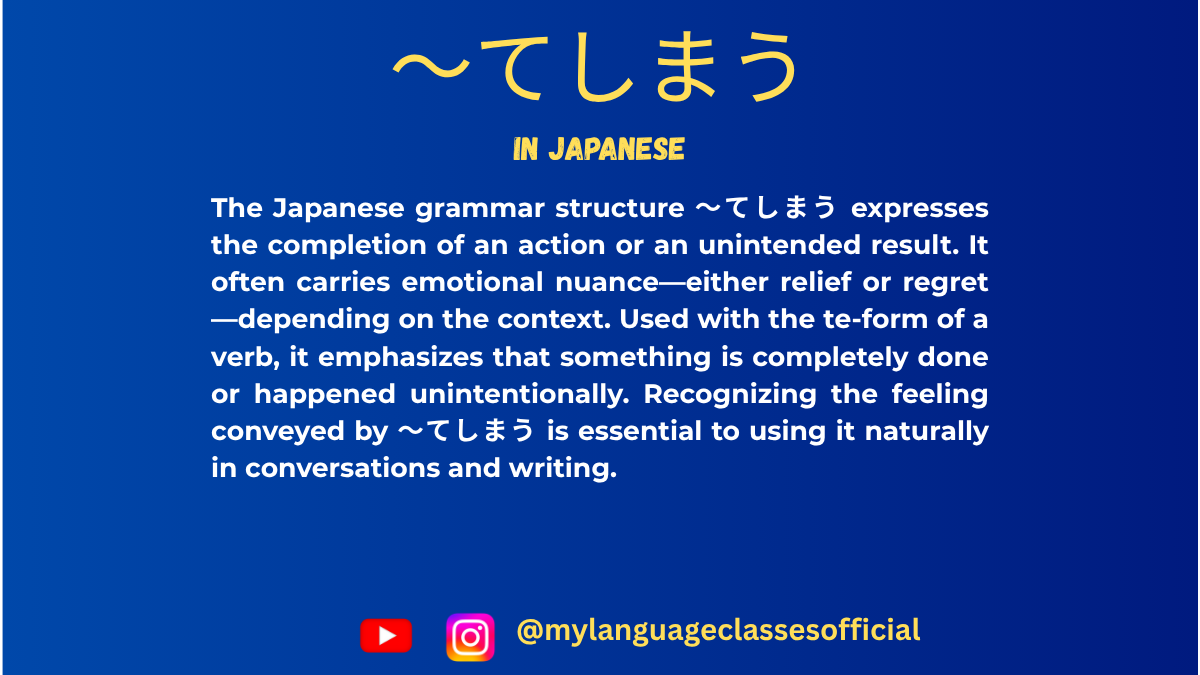Your cart is currently empty!
Tag: Japanese て-form
-

Expressing Completion or Regret in Japanese:〜てしまう| My Language Classes
Using 〜てしまう in Japanese
In Japanese, the grammar structure 〜てしまう plays a significant role in expressing either the completion of an action or a sense of regret, often depending on the context. This nuanced construction can elevate your Japanese proficiency, helping you convey subtle emotions and intentions effectively.
Let’s delve into its usage, nuances, and common situations where it applies.
What is 〜てしまう?
The form 〜てしまう is derived by attaching しまう to the て-form of a verb. The meaning can vary based on context, and it is commonly shortened in casual speech to 〜ちゃう or 〜じゃう.
- Completion: Indicates that an action has been entirely or thoroughly completed.
- Regret/Unintended Outcome: Expresses a sense of regret, disappointment, or that something happened unintentionally.
How to Form 〜てしまう
- Take the て-form of the verb.
- Example: 飲む (to drink) → 飲んで
- Add しまう.
- 飲んでしまう (to finish drinking or drink unintentionally)
Casual Contractions:
- 〜てしまう → 〜ちゃう
- 飲んでしまう → 飲んじゃう
- 〜でしまう → 〜じゃう
- 食べてしまう → 食べちゃう
Situations Where 〜てしまう is Used
- Expressing Completion of an Action
- Used to indicate that an action is finished, often with a sense of thoroughness or finality.
- Example:
- 宿題を全部やってしまいました。 (I finished all my homework.)
- ケーキを食べてしまった。 (I ate the entire cake.)
- Expressing Regret or an Unintended Outcome
- When an action leads to an unintended or regrettable result.
- Example:
- 大事な書類をなくしてしまった。 (I lost an important document.)
- 電車に傘を忘れてしまいました。 (I accidentally left my umbrella on the train.)
- Expressing Uncontrollable Situations
- Used to convey situations beyond the speaker’s control.
- Example:
- 窓が風で閉まってしまった。 (The window shut because of the wind.)
- Expressing Emotional Impact
- Can emphasize feelings of surprise, disappointment, or unintended consequences.
- Example:
- こんなに早く雨が降ってしまうなんて思わなかった。 (I didn’t think it would start raining so soon.)
- Hypothetical or Future Concerns
- Used when imagining an unintended or regretful scenario in the future.
- Example:
- テストで間違えてしまうかもしれない。 (I might make a mistake on the test.)
Key Points to Remember
- Context is Crucial:
- Depending on the situation, 〜てしまう can mean either “to finish” or “to regret.” The tone, verb, and surrounding context clarify its intended meaning.
- Shortened Forms are Common:
- In casual conversation, the contracted forms ちゃう and じゃう are more commonly used.
- Polite vs. Casual Speech:
- Formal: 書いてしまいました。 (I finished writing.)
- Casual: 書いちゃった。 (I finished writing.)
- Adding Emotional Nuance:
- Using 〜てしまう adds depth to your expression, allowing you to highlight feelings of regret, completion, or an unexpected event.
Examples of Common Scenarios
Situation Example Sentence Translation Accidental Action コーヒーをこぼしてしまいました。 (I accidentally spilled the coffee.) Forgot Something 鍵を家に忘れてしまった。 (I left my keys at home.) Regretful Action 寝坊してしまった。 (I overslept.) Uncontrollable Event 雨が降ってしまった。 (It started raining.) Complete Action 本を全部読んでしまいました。 (I finished reading the entire book.) Hypothetical Concern 試験に遅れてしまうかもしれない。 (I might be late for the exam.)
Why Use 〜てしまう?
- Adds Emotional Depth:
- Helps convey your feelings of regret, surprise, or relief.
- Expresses Finality:
- Perfect for emphasizing the completion of an action.
- Natural and Fluent Japanese:
- Using 〜てしまう naturally in conversation makes your Japanese sound more native-like.
Practice Tip: Try incorporating 〜てしまう in daily life scenarios or journaling your day in Japanese. Write about actions you completed, unintended events, or things you regretted doing.
Example Practice Sentence:
- 昨日、友達に秘密を言ってしまいました。 (Yesterday, I accidentally told my friend a secret.)
By mastering 〜てしまう, you’ll enhance your ability to express subtle emotions and actions naturally, making your Japanese more dynamic and expressive.
If you enjoyed this lesson, be sure to check out more posts like this on my blog at My Language Classes. Don’t forget to subscribe my YouTube channel and follow me on Instagram for the latest language learning tips and lessons. Leave a comment below to share your thoughts, or ask any questions you have about nouns.
Happy learning! 😊
